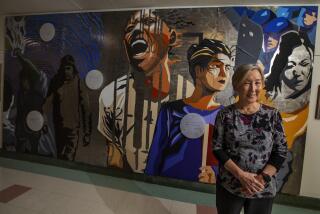Rupert Costo; American Indian Scholar Who Fought Stereotypes
- Share via
Rupert Costo, Cahuilla Indian activist and scholar who in the 1950s formed the American Indian Historical Society to promote and develop the culture, education and welfare of Indians, died Friday at his San Francisco home.
Costo, with his Cherokee wife Jeannette, also fought for the scholarly representation of Indians rather than the stereotypes they found prevalent.
He most recently had been in the news when he opposed the canonization of Father Junipero Serra, an 18th-Century missionary the couple called “an arrogant, opinionated, hypocritical Inquisition commissioner . . . who history holds responsible for the decimation of hundreds of thousands of Indian people” in California.
Costo was raised on a reservation near Hemet and worked as an engineer, meteorologist, surveyor and lobbyist for the federal agency that oversees Indian affairs in Washington.
He studied at Riverside Community College, Whittier College and the University of Nevada and was a retired engineer for the California Department of Transportation.
In 1986 the Costos raised $400,000 to endow the first chair for American Indian studies in the University of California system, at UC Riverside. It remains one of only a handful in the nation.
The bulk of the money came from the Costos’ three-story mansion in the Haight-Ashbury area of San Francisco, which had been the headquarters for their society.
Much of their library of 15,000 books, treaties, legal documents, prints and paintings also went to the university.
Jeannette Costos asks contributions to the UC Riverside Foundation in the name of the Rupert Costo Chair in American Indian History.
More to Read
Sign up for Essential California
The most important California stories and recommendations in your inbox every morning.
You may occasionally receive promotional content from the Los Angeles Times.












